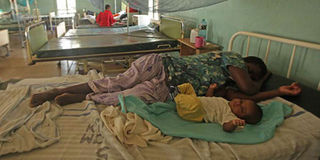Poor services and drug shortages ruin public hospitals

A patient who has not been attended to by Kisumu County Hospital medics rests with her newborn, on February 2, 2019. The hospital does not have adequate resources. PHOTO | TONNY OMONDI | NATION MEDIA GROUP
What you need to know:
- At Rachuonyo South Hospital in Oyugis, Mr Meshack Otieno used Sh7,000 on water for his expectant wife. The hospital did not have water.
- Chulaimbo Hospital's maternity wing, which was built five years ago, has been converted into a store. The ward has not received the 20 beds it requires.
Ms Ednah Chepchumba, a nurse, has lost count of the times she has used a torch while handling deliveries.
For the three years she has been at Masol Dispensary in West Pokot County, Ms Chepchumba has had to put up with many challenges.
The hospital has solar panels for lighting but the batteries run out of power. When this happens, the spotlight comes in handy.
The county government promised to buy and instal new batteries by May. Two weeks ago, the Ministry of Energy officials were at the dispensary to have a look at the panels, but the workers and the administration have not heard from them since.
In the meantime, county officials purchased a small battery but the nurse says its light is not strong enough for the entire maternity ward.
POOR RESOURCES
The room is small and that means there is no privacy for the women. And there is no waiting room either.
The examination couch doubles up as the delivery bed. There is no drainage or sink.
And that is not all. There is no water and more often than not, the nurse has had to dig into her pockets to buy water at Sh20 per jerrycan.
The dispensary has a generator for pumping water, but it is broken down.
Ms Chepchumba's story captures the deplorable conditions in most of public hospitals.
A survey by the Saturday Nation has unearthed shocking conditions patients must endure. They range from sharing beds to being made to buy basic drugs from private clinics.
NEGLIGENCE
In Taita-Taveta County, patients prefer seeking treatment in Tanzania than go to public hospitals.
At Rachuonyo South Hospital in Oyugis, Mr Meshack Otieno used Sh7,000 on water for his expectant wife. The hospital did not have water.
Mr Otieno says he had to shuttle between Kosele and Oyugis, a distance of about 40 kilometres, daily to deliver 40 litres of water to his wife.
Elsewhere, Mr Sese Mukhwana narrated how his father - who had hernia - died at Kakamega Referral Hospital a month ago. He blames negligence for his father’s death.
“I took my father to the hospital at 8am but he had not been attended to by 6pm. He died at 10pm when his gall bladder burst,” he said.
LACK OF DRUGS
The situation is not better at Kisumu County Hospital. Cases of patients sharing beds or sleeping on the floor are common. Even the newborn unit is congested.
Chulaimbo Hospital's maternity wing, which was built five years ago, has been converted into a store. The ward has not received the 20 beds it requires.
In Taita-Taveta, patients struggle to get basic drugs, including painkillers. Those interviewed said they have to dig deeper in their pockets to pay for the medicines at private pharmacies.
At Kitobo Dispensary, for example, locals complain of being referred to Taveta to buy medicine.
“We have to endure the pain because the drug shops are far. Many families are poverty-stricken and cannot afford services or medicine at private hospitals,” Mr Jacob Mwangangi, a villager, told the Saturday Nation.
Those who cross the border to Tanzania say they are tired of being referred to private pharmacies and laboratories.
They usually go to Kwa Minja Hospital or Kilimanjaro Christian Medical Centre.
“I would rather travel to Tanzania instead of wasting my time here because I will not get quality treatment,” Ms Peninah Mutua, a resident, said.




